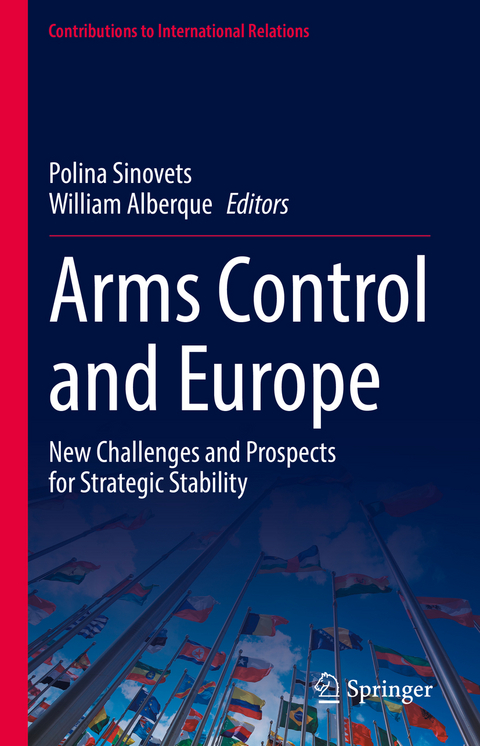
Arms Control and Europe
Springer International Publishing (Verlag)
978-3-031-03890-7 (ISBN)
Divided into three parts, the book presents timely analyses on (1) US, Russia: New Challenges and Strategic Stability in Europe; (2) Extended Deterrence and Arms Control in Europe; and (3) Regional Dimensions of Strategic Stability in Europe. It further offers perspectives from and case studies on different countries, such as Ukraine, France, Germany, the United Kingdom, the USA, Turkey, Poland, and Romania.
This book is a must-read for scholars for international relations, as well as policy-makers interested in a better understanding of the changing international security architecture, Russia's strategy, arms control, nonproliferation, and the future of nuclear deterrence.
lt;b> Polina Sinovets is an Associate Professor at the Faculty of International Relations, Political Science, and Sociology of Odesa I.I. Mechnikov University, Ukraine. She is also the Head of the Odesa Center for Nonproliferation, based at Mechnikov University. She previously worked as a senior research associate at Ukraine's National Institute for Strategic Studies. In 2006, she was a research fellow at the James Martin Center for Nonproliferation Studies, Washington DC, USA; a research fellow at the NATO Defence College in Rome, Italy, in 2015; and in 2017/18 a Fulbright Scholar at the James Martin Center for Nonproliferation Studies in Washington DC, USA. She is an expert on nuclear weapons policy and published various articles on the topic.
William Alberque is the Director of the Strategy, Technology, and Arms Control Programme at the International Institute for Strategic Studies in Berlin, Germany, focusing on nuclear deterrence and non-proliferation, arms control, risk reduction, and other international security issues. He previously served as the Director of NATO's Arms Control, Disarmament, and Non-Proliferation Centre, and worked for the US Government for more than two decades on nuclear security and safeguards, WMD non-proliferation, arms control, CSBMs, SALW, CBRN defense, pandemic response, and nuclear accident response.
Introduction.- PART I. THE US, RUSSIA: NEW CHALLENGES AND STRATEGIC STABILITY IN EUROPE.- The US Arms Control Agenda: Impact on Europe.- Russia's Foreign and Security Policy: the Evolution of the Escalation Strategy.- The Crisis of Nuclear Arms Control Amid Russia´s Military Offense Against Ukraine.- Russia and Conventional Arms Control in Europe.- New Technologies and Nuclear Deterrence.- PART II. EXTENDED DETERRENCE AND ARMS CONTROL IN EUROPE.- The Nuclear Umbrella in Europe.- Nuclear Deterrence and Strategic Stability in Europe: French Positions and Perceptions.- The UK's Current Force Structure and Posture.- Germany's Position on the Future of Extended Deterrence and Arms Control in the Euro-Atlantic Region.- Arms Control in Europe and Extended Deterrence: A View from Turkey.- PART III. REGIONAL DIMENSIONS OF STRATEGIC STABILITY IN EUROPE.- Security and Defense Policy of Ukraine in the Main Provisions and Objectives of Its Strategic Documents.- Ukraine's Policy towards Regimes of Non-Proliferation and Arms Control.- Strategic Risk Reduction in the Black Sea Region.- Regional Approaches to Strengthening the Eastern Flank of NATO: Case of Poland and Romania.- Iranian Nuclear Program and Its Impact on the European Security System.
| Erscheinungsdatum | 10.08.2022 |
|---|---|
| Reihe/Serie | Contributions to International Relations |
| Zusatzinfo | XI, 172 p. 1 illus. |
| Verlagsort | Cham |
| Sprache | englisch |
| Maße | 155 x 235 mm |
| Gewicht | 441 g |
| Themenwelt | Sozialwissenschaften ► Politik / Verwaltung ► Europäische / Internationale Politik |
| Sozialwissenschaften ► Politik / Verwaltung ► Vergleichende Politikwissenschaften | |
| Schlagworte | Black Sea Region • Conflict zones • defense policy • European Security • France • Germany • International Security • Invasion • NATO • New military technologies • Nonproliferation system • Nuclear Deterrence • Nuclear Program • nuclear umbrella • Russia • Russia's military offense • Strategic risk reduction • Ukraine • United Kingdom • United States |
| ISBN-10 | 3-031-03890-8 / 3031038908 |
| ISBN-13 | 978-3-031-03890-7 / 9783031038907 |
| Zustand | Neuware |
| Haben Sie eine Frage zum Produkt? |
aus dem Bereich


